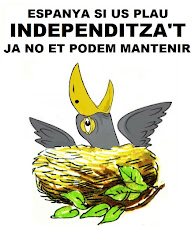- Que "podria passar" que ”d'aquí a un temps” ens haguéssim d'afrontar amb un “dilema”.
- Que el “nacionalisme català” ja “no té motius per no adherir-se” a l'independentisme.
- Que mentre “esperem” (sic) un hipotètic referèndum oficial i vinculant el nostre objectiu és reforçar-nos internament en economia, en creativitat cultural i en reforçament de la societat civil” i, a més, “sense esperar gaire ajut ni justícia”.
- Que “hi ha país” (gent amb iniciativa) que anirà “aplicant dia a dia el seu dret a decidir”.
Com pot ser que ens digui que "podria passar" que ens haguéssim d'afrontar “d'aquí a un temps” a la disjuntiva (“dilema” que diu ell) que ens portaria a la independència? De quan temps parla? Necessitem trenta anys més per pensar-ho?
Que el nacionalisme català “no té motius per no adherir-se” a l'independentisme és tan evident des de fa tants anys que em sorprèn molt que algú com en Jordi Pujol li hagi costat tant a dir-ho.
Com creu en Jordi Pujol que hem “d'esperar” un referèndum vinculant per la independència? Potser creu que al Quebec varen “esperar” el referèndum vinculant? Com creu que el varen esperar?
I com creu que anirem aplicant “dia a dia” el dret a decidir?
Francament, crec que l'ex Molt Honorable no té les idees gens clares i el garbuix d'arguments que exposa al seu escrit reforça la meva opinió.
Comença dient que el Tribunal Constitucional ha actuat per pressió del PP i que no representa la opinió del PSOE ni de la majoria de l'opinió pública espanyola. Això és absolutament fals. L'opinió pública espanyola, majoritàriament, suporta les retallades de l'estatut i el PSOE està en perfecta sintonia amb el PP pel que fa als afers d'Estat.
Diu que fa uns anys “una evolució favorable de la interpretació de la constitució” i una “col·laboració política i econòmica i d'hàbits convivencials entre Catalunya i Espanya” podria permetre “el reconeixement clar i consolidat de la personalitat pròpia i diferenciada de Catalunya”. De debò ho creia així en Jordi Pujol? Com es pot interpretar una constitució que no atorga a Catalunya competències de debò en finances, model lingüístic, justícia o en educació? No ho sap que en tots aquests camps la constitució espanyola del 1978 supedita tot el que s'administri aquí a Leyes Orgánicas aprovades a Madrid?
Però ell parla en canvi d'un “gruix de competències que realment signifiquessin un autogovern molt important”. Sap les competències que té un estat federat qualsevol? Quina mena d'autogovern podia esperar d'una constitució aprovada amb el beneplàcit de les autoritats franquistes de l'època?
També parla d'un “finançament adequat per atendre bé els seus ciutadans i aplicar projectes col·lectius ambiciosos”. Com pot dir això quan ell mateix diu que Navarra i el País Basc só les úniques autonomies amb Concert Econòmic? Això és aixi perquè ho diu la Constitució Espanyola , sigui quina sigui la seva interpretació. I aquesta constitució data del 1978.
Quina bona atenció han tingut els ciutadans de Catalunya durant els darrers trenta anys, quan hem sigut testimonis de que Catalunya ha passat de ser la regió més rica d'Espanya a una de les més pobres? Quin projecte col·lectiu ambiciós va projectar en Jordi Pujol quan era President? Omplir-nos de multinacionals japoneses que ara pleguen o amenacen de plegar si no reben diners dels nostres impostos?
Després parla del Quebec, sense mostrar gaire coneixement de la política canadenca. Diu que “el Quebec no es trobaria bé en el Canadà si se l'equiparés a Alberta, Labrador, Ontario o la Columbia Britànica”. Deixant de banda el fet de que el Labrador no és una província Canadenca, en Jordi Pujol hauria de saber que el Canadà és un Estat federal, on els tres nivells de poder (federal, provincial i local) no se solapen i totes les províncies tenen competències de debò i capacitat legislativa en àmbits tals com Hisenda, Justícia, Treball i Immigració (curiosament en aquest darrer àmbit, tot i que la Constitució espanyola no en diu res, CiU i ERC van renunciar a reclamar-ne competències en el darrer estatut).
Només gràcies a una pressió immensa del Partit Quebecois (que sempre ha exigit la independència i sempre ho ha fet sense embuts) la Constitució Canadenca reconeix que el Quebec és una Nació. I, el que és més important, el finançament de les províncies dóna una balança fiscal molt favorable al Quebec (i es publica cada any).
Creu que sense una lluita immensa dels sobiranistes quebequesos seria una realitat avui dia el model bilingüistic del Canadà, que només és vigent des de l'època del primer ministre Pierre Trudeau?
Potser creu que el Quebec ha anat “esperant” un referèndum gràcies a un poble “amb iniciativa” que ha anat “aplicant dia a dia el seu dret a decidir”?
No ha sentit mai parlar de la Crisi de l'octubre del 1970 al Quebec ni de la “War Measures Act”?
En fi, si hem de seguir fent cas a en Jordi Pujol, podem esperar un parell de generacions més amb gent “amb iniciativa” mentre s'acaba de desmantellar el nostre país, tant econòmicament com culturalment.























